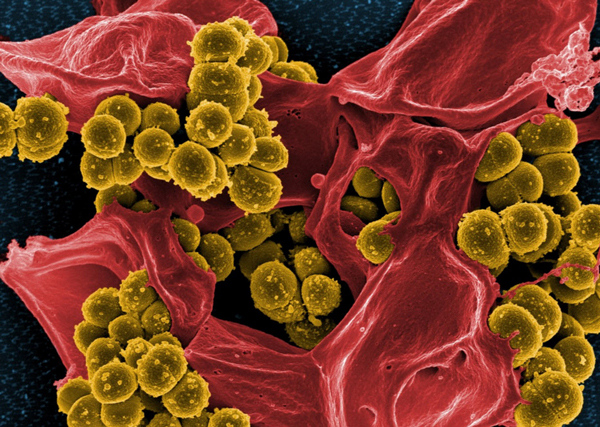Serious worldwide threat to public health noted in WHO’s first global report on antibiotic resistance
May 1, 2014

The MRSA superbug (in yellow), often found in hospitals, is resistant to antibiotics and can lead to death, but a new polymer-antibiotic combo to deal with MRSA is in the works (credit: National Institute of Allergy and Infectious Diseases)
Antimicrobial resistance (including antibiotic resistance — when bacteria change so antibiotics no longer work) is a serious threat and has gone global, warns the World Health Organization (WHO) in a report, “Antimicrobial resistance: global report on surveillance.”
“Without urgent, coordinated action by many stakeholders, the world is headed for a post-antibiotic era, in which common infections and minor injuries which have been treatable for decades can once again kill,” says Dr Keiji Fukuda, WHO’s Assistant Director-General for Health Security.
The report focuses on antibiotic resistance in seven different bacteria responsible for common, serious diseases such as bloodstream infections (sepsis), diarrhoea, pneumonia, urinary tract infections and gonorrhoea.
Key findings from the report include:
- Resistance to the treatment of last resort for life-threatening infections caused by a common intestinal bacteria, Klebsiella pneumoniae–carbapenem antibiotics–has spread to all regions of the world. K. pneumoniae is a major cause of hospital-acquired infections such as pneumonia, bloodstream infections, infections in newborns and intensive-care unit patients. In some countries, because of resistance, carbapenem antibiotics would not work in more than half of people treated for K. pneumoniae infections.
- Resistance to one of the most widely used antibacterial medicines for the treatment of urinary tract infections caused by E. coli — fluoroquinolones — is very widespread. In the 1980s, when these drugs were first introduced, resistance was virtually zero. Today, there are countries in many parts of the world where this treatment is now ineffective in more than half of patients.
- Treatment failure to the last resort of treatment for gonorrhoea — third generation cephalosporins — has been confirmed in Austria, Australia, Canada, France, Japan, Norway, Slovenia, South Africa, Sweden and the United Kingdom. More than 1 million people are infected with gonorrhoea around the world every day.
- Antibiotic resistance causes people to be sick for longer and increases the risk of death. For example, people with MRSA (methicillin-resistant Staphylococcus aureus) are estimated to be 64% more likely to die than people with a non-resistant form of the infection. Resistance also increases the cost of health care with lengthier stays in hospital and more intensive care required. (However, University of South Carolina researchers have developed a new class of charged metallopolymers that promise to make conventional antibiotics effective against MRSA, according to an April 30 report in the Journal of the American Chemical Society.)
Ways to fight antibiotic resistance
The report reveals that key tools to tackle antibiotic resistance, such as basic systems to track and monitor the problem, show gaps or do not exist in many countries.
Other important actions include preventing infections from happening in the first place — through better hygiene, access to clean water, infection control in health-care facilities, and vaccination — to reduce the need for antibiotics. The report is also kick-starting a global effort led by WHO to address drug resistance, including development of tools and standards and improved collaboration around the world to track drug resistance, measure its health and economic impacts, and design targeted solutions.
People can help tackle resistance by:
- using antibiotics only when prescribed by a doctor;
- completing the full prescription, even if they feel better;
- never sharing antibiotics with others or using leftover prescriptions.
Health workers and pharmacists can help tackle resistance by:
- enhancing infection prevention and control;
- only prescribing and dispensing antibiotics when they are truly needed;
- prescribing and dispensing the right antibiotic(s) to treat the illness.
Policymakers can help tackle resistance by:
- strengthening resistance tracking and laboratory capacity;
- regulating and promoting appropriate use of medicines.
Policymakers and industry can help tackle resistance by:
- fostering innovation and research and development of new tools;
- promoting cooperation and information sharing among all stakeholders.
The report, which also includes information on resistance to medicines for treating other infections such as HIV, malaria, tuberculosis and influenza, provides the most comprehensive picture of drug resistance to date, incorporating data from 114 countries.